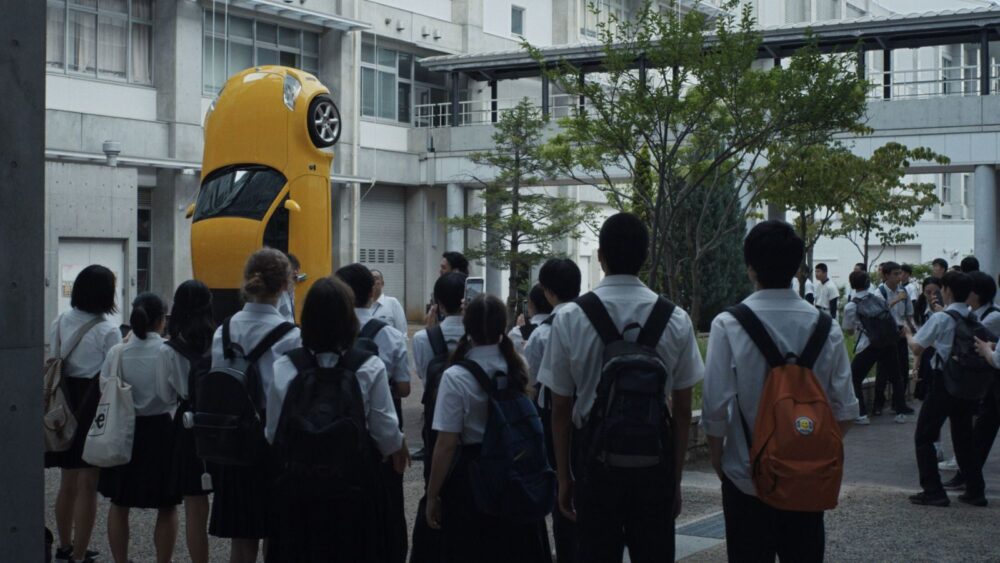The potential for dread and disaster looms over Neo Sora’s “Happyend,” which made its US premiere at this year’s iteration of the New York Film Festival. Threats of earthquake, political unrest, and sinister vandalism surround a Tokyo prep school in what we’re told is the “near future,” but these prove to be MacGuffins in an otherwise conventional prep-school dramedy.
Sora returns to NYFF after last year’s sublime “Ryuichi Sakamoto | Opus,” a loving and melodic tribute to the director’s late father. Rich in visual and aural flair but bloated in its delivery, “Happyend” promises to tackle some meaty material and in doing so, spreads itself too thin. Macro issues take precedent, diminishing characters and elevating the system (i.e. school, government) which entraps them, an ironic and unfortunate result considering the film’s weariness of those in power.
A Future-Set Film that Looks Anything But
Announcing this as a story that takes place “in the future,” Sora is making a premature bid to define the film. And yet, nothing about this future feels revelatory or speculative. In fact, some elements seem almost dated. While it’s possible that Sora’s goal is to persecute the slippery logic that leads to surveillance and overreach, the introducing scenes suggest a small-scale saga of prep-school friends on the cusp of graduating. Kou (Yukito Hidaki) and Yuta (Hayao Kurihara) are best friends, united both in their love of techno music, and that shared, unwavering bond that grows for a while until it sticks, and begins to melt away, and then it’s gone entirely.
The tender, almost elegiac tone soon shifts gears when, in response to a prank Principal Nagai (Shiro Sano) describes as “terrorism,” the school deploys a paranoid surveillance system to follow all students, and judge them based on an ill-defined points system. Eventually, a group of agitated classmates (most of them are not Japanese natives) storm the principal’s office to demand he get rid of the invasive monitoring, which of course he’d claimed was for safety purposes.
More NYFF62 Coverage: “Eephus,” and “The Room Next Door“
The activism mirrors broader unrest outside the school, where several students (and one teacher) partake in anti-government protests. If the surveillance system suggests science fiction, the political motifs imply stark ripped-from-the-headlines realism, the catch-phrasing and slogans spewed out too familiar to serve as a warning or a sign of looming decay.

Sidelining Central Relationships in Favor of a Mishmash of Ideas
And then, there are the earthquakes. On television, the Prime Minister warns about a forthcoming disaster, and the students are subject to shrieking sirens and safety drills. A light in a restaurant shakes, so do the desks, and while on one occasion an earthquake causes damage (especially to Principal Nagai’s yellow sports car), Sora’s script doesn’t fully invest in that theme of destruction and collapse. Instead, it just seems tacked-on, and it sidelines the anxieties and relationships of these students, who are reckoning with their current and future place in the world beyond the school’s suffocating purview.
When the character development and narrative momentum lags, “Happyend” does stand out for its vivid visual style (the sports car turned on its side is a particularly memorable image) and haunting music. Once again, Sora teams up with “Opus” collaborators Bill Kirstein (Director of Photograph) and Miki Nomura (Sound Supervisor); as well as with composer Lia Ouyang Rusli for the film’s witty, suggestive score. Combining thumping synth and gentler orchestral strings, Ouyang Rusli evokes both “Opus” and “A Clockwork Orange,” though “Happyend” has neither the peaceful sensibility of the former nor the violent edge of the latter. Sora has a gift for demanding audience engagement, but the script overindulges on a diet of current events, drifting from the central relationships.
And so, “Happyend” ultimately becomes a morality tale of sorts, a finger-wave warning about power structures and citizens’ complacency, which could be frightening if this future didn’t already look conspicuously like the present.
“Happyend” screened at the New York Film Festival, which runs from September 27th – October 14th. Follow us for more coverage.